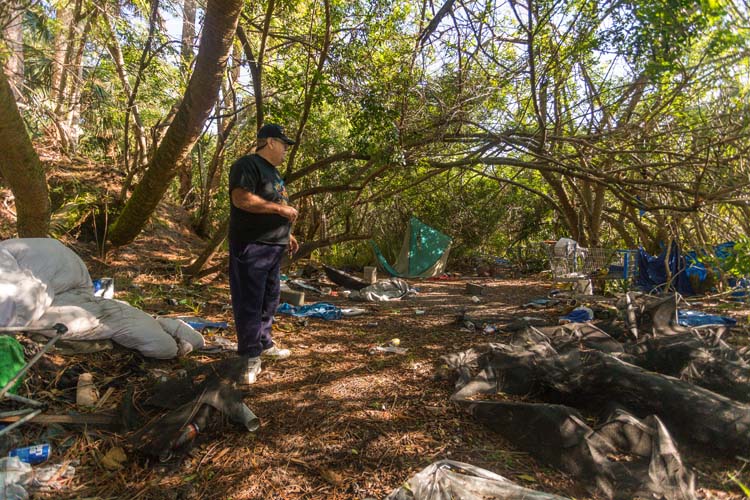
Despite passionate pleas from homeless advocates and a veteran who has slept on the streets, the Indian River County Commission declined to review its inventory of surplus land to look for parcels that could be used for affordable housing – for now.
Instead, commissioners last week told the Affordable Housing Advisory Committee it should review the catalog of surplus county land – acreage the county owns but has no current or projected future use for – and then present the commission with a recommendation as to which tracts would be suitable for low-cost housing.
The decision came after several shelter volunteers and a formerly homeless U.S. Navy veteran begged the commission for help.
“We need a place to go. There is none,” Navy veteran Edmund Newfield said. “Please give us a chance.”
Commissioner Tim Zorc pushed for the commission review because of the homeless problem plaguing the area, he said. Donating land to a nonprofit specializing in building affordable housing is the least the county could do, he added.
“When you look at a project, one of the biggest cost hurdles you have to get over first is the cost of land for a project,” Zorc said.
Zorc’s fellow commissioners agreed the county must step up to help, even though they were not ready to undertake an immediate staff survey of available land.
“I don’t think the free market is going to fix it,” Commissioner Peter O’Bryan said. “There’s no builder out there right now that’s going to develop a subdivision and voluntarily build 1,500-square-foot homes with Formica countertops and no crown molding that might be affordable.”
The commission in June approved giving nonprofit affordable housing provider Every Dream Has a Price three lots on the county’s surplus land list for the organization to build workforce housing for individuals who can’t afford market-rate housing. If the units – which must remain affordable in perpetuity – are not built within three years, the land will revert to the county unless the jurisdiction extends the timeframe.
The Source, a Vero Beach-based Christian ministry that provides cold night shelters, emergency hunger relief, counseling and benefit referrals to the county’s growing homeless population also hopes to put a dent in the problem. The charitable organization plans to build a village of 100 tiny homes for the homeless or those on the brink of homelessness. The group is eyeing purchasing a 25-acre tract of land in south county properly zoned for the village.
The latest data on homelessness shows the issue is a profound problem locally. The “Point in Time” survey by the Department of Housing and Urban Development released earlier this year found 1,499 individuals – 1,042 adults and 457 children – homeless on the Treasure Coast, including 486 people in Indian River County, up 39 from the prior year.
Homeless advocates believe a steady increase in housing costs while salaries remain stagnant is a significant contributor to the problem. Home prices here increased roughly 40 percent from 2012 to 2018, while household income has only risen seven percent from $40,813 in 2012 to $43,477 in the fall of 2018, according to data from the U.S. Census Bureau’s American Community Survey and the Shimberg Center for Housing Studies.



